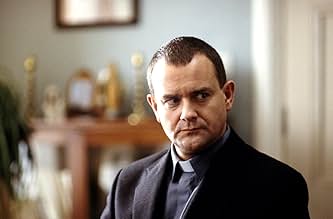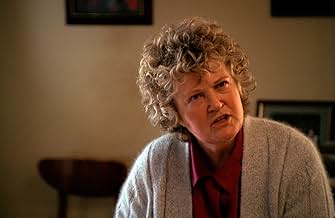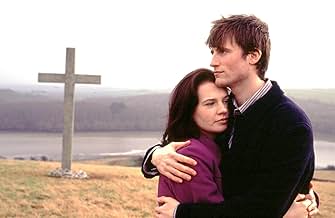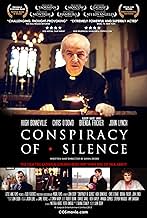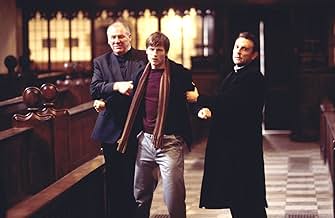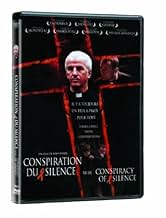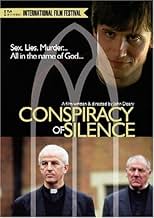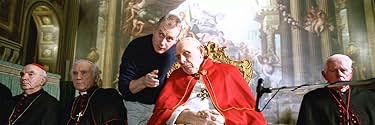A Catholic priest's suicide and seminarian's expulsion for homosexuality spark a local journalist's investigation, uncovering celibacy controversies and abuse cover-ups within the Irish Cath... Read allA Catholic priest's suicide and seminarian's expulsion for homosexuality spark a local journalist's investigation, uncovering celibacy controversies and abuse cover-ups within the Irish Catholic church.A Catholic priest's suicide and seminarian's expulsion for homosexuality spark a local journalist's investigation, uncovering celibacy controversies and abuse cover-ups within the Irish Catholic church.
- Awards
- 2 wins & 3 nominations total
Padraig O'Loinsigh
- Father Sweeney
- (as Patrick Lynch)
- Director
- Writer
- All cast & crew
- Production, box office & more at IMDbPro
Featured reviews
In the last decade or two a lot of news has come out about the Catholic Church's cover-up of pedophilia. John Deery's "Conspiracy of Silence" isn't about that but about something similar: the church's policy of celibacy. In this case, the suicide of a gay priest living with HIV and the expulsion of some students suspected of a same-sex relationship prompt an article questioning the rightness of the church's celibacy policy.
It seems very likely that forcing priests to be celibate increases the risk of the priests' molesting children. Relationships are natural among all species, and not letting people be in relationships can only damage them. This is not to be confused with pedophilia, which is a disease. But either way, the Catholic Church has had a history of suppressing all news of the molestations, as well as a history of homophobia.
"Conspiracy of Silence" isn't a great movie but does a good job looking at these different topics. It's all the more impressive considering that the director was a first timer. I recommend it.
It seems very likely that forcing priests to be celibate increases the risk of the priests' molesting children. Relationships are natural among all species, and not letting people be in relationships can only damage them. This is not to be confused with pedophilia, which is a disease. But either way, the Catholic Church has had a history of suppressing all news of the molestations, as well as a history of homophobia.
"Conspiracy of Silence" isn't a great movie but does a good job looking at these different topics. It's all the more impressive considering that the director was a first timer. I recommend it.
CONSPIRACY OF SILENCE is a moody, dark, probing inquiry into the concept of celibacy of priests in the Catholic Church in Ireland and all the way to the Vatican. The concept, story and script by Writer/Director John Deery are tight, arrow sharp in aim, but ultimately unresolved issues cloud the success of what could have been a pungent movie.
Set in a seminary in Ireland for preparing young men for the priesthood, we are introduced to some warmly human characters such as Daniel McLaughlin (Jonathan Forbes), a squeaky clean lad who gave up a girlfriend Sinead (Catherine Walker) to follow his (and his family's) life ambition to become a priest. Naive, warm, loving, athletic and bright, he is the seminary poster boy - until one evening after hours he innocently visits a fellow seminarian's room and is the focus of seduction by the student who kindly says 'we're all only human and have our needs'. Daniel gently declines the advances, leaves the student's room but is observed by an old priest with demons of his own. The priest reports the incident and Daniel is abruptly thrown out of the seminary by the evil Rector Cathal (Sean McGinley) for being homosexual - a charge that couldn't be farther from the truth.
At the same time in another part of the seminary the fine Father Sweeney dresses in all his priestly regalia and commits suicide is a gruesome way. His suicide is threatening to the staff of the seminary and a cover-up is immediately put in place. It seems Father Sweeney some four years ago had stirred controversy in the Vatican by publicly exposing his HIV status, alerting the Church and the world that HIV was rampant in the world wide Church. His partner left the priesthood, disillusioned, but following FR Sweeney to the seminary in Ireland.
An earnest reporter David Foley (Jason Barry) begins the investigation of the suicide and in doing so finds the reason for Daniel's expulsion as well as the myriad dark secrets being covered by the Church - all to do with the concept of celibacy and the inevitable sequelae of sensual deprivation on priests. One Father Jack Dowling (Hugh Bonneville) supports David and Daniel and is disenchanted with the behavior of the Church against its own priests. Then, without resolving any of these fascinating strings of thought the movie ends, leaving many questions unanswered - as though there are no answers.
The acting is uniformly strong (including the likes of Brenda Fricker as Daniel's mother et al), for once giving a spectrum of the priesthood that is not favoring bad or good. These characters are men with convictions and none can be faulted for their stances. The setting in Ireland is magnificently captured by cinematographer Jason Lehel, and Francis Haines and Stephen W. Parsons provide a hauntingly beautiful musical score. As far as it takes us this is a fine film. Perhaps Deery is planning Part II to finish this story! Grady Harp
Set in a seminary in Ireland for preparing young men for the priesthood, we are introduced to some warmly human characters such as Daniel McLaughlin (Jonathan Forbes), a squeaky clean lad who gave up a girlfriend Sinead (Catherine Walker) to follow his (and his family's) life ambition to become a priest. Naive, warm, loving, athletic and bright, he is the seminary poster boy - until one evening after hours he innocently visits a fellow seminarian's room and is the focus of seduction by the student who kindly says 'we're all only human and have our needs'. Daniel gently declines the advances, leaves the student's room but is observed by an old priest with demons of his own. The priest reports the incident and Daniel is abruptly thrown out of the seminary by the evil Rector Cathal (Sean McGinley) for being homosexual - a charge that couldn't be farther from the truth.
At the same time in another part of the seminary the fine Father Sweeney dresses in all his priestly regalia and commits suicide is a gruesome way. His suicide is threatening to the staff of the seminary and a cover-up is immediately put in place. It seems Father Sweeney some four years ago had stirred controversy in the Vatican by publicly exposing his HIV status, alerting the Church and the world that HIV was rampant in the world wide Church. His partner left the priesthood, disillusioned, but following FR Sweeney to the seminary in Ireland.
An earnest reporter David Foley (Jason Barry) begins the investigation of the suicide and in doing so finds the reason for Daniel's expulsion as well as the myriad dark secrets being covered by the Church - all to do with the concept of celibacy and the inevitable sequelae of sensual deprivation on priests. One Father Jack Dowling (Hugh Bonneville) supports David and Daniel and is disenchanted with the behavior of the Church against its own priests. Then, without resolving any of these fascinating strings of thought the movie ends, leaving many questions unanswered - as though there are no answers.
The acting is uniformly strong (including the likes of Brenda Fricker as Daniel's mother et al), for once giving a spectrum of the priesthood that is not favoring bad or good. These characters are men with convictions and none can be faulted for their stances. The setting in Ireland is magnificently captured by cinematographer Jason Lehel, and Francis Haines and Stephen W. Parsons provide a hauntingly beautiful musical score. As far as it takes us this is a fine film. Perhaps Deery is planning Part II to finish this story! Grady Harp
I saw this film on holiday in Galway. It was a headliner at the Galway Film Fleadh. The experience was rather surreal because most of the starring cast were present for the premiere.
John Deery examines the question of celibacy in the Catholic church with pride and skepticism. The viewer doesn't quite know which side he stands on, but he is clearly a devout Catholic as well as a fighter for a more just way of treating priests. Although a much less controversial treatment, this film is in the same vein as 1994's Priest. This film may be a little more universal and pleasing to one's own beliefs, though.
Actors Jonathan Forbes and Brenda Fricker have many pointed moments together on screen, but frankly that should come as no surprise. After all, what has Brenda Fricker ever been in that has been bad? All of the other actors do a fine job, as well.
I recommend that if you come across a screening of this film, to see it...especially if you are Catholic. If not, rent it.
John Deery examines the question of celibacy in the Catholic church with pride and skepticism. The viewer doesn't quite know which side he stands on, but he is clearly a devout Catholic as well as a fighter for a more just way of treating priests. Although a much less controversial treatment, this film is in the same vein as 1994's Priest. This film may be a little more universal and pleasing to one's own beliefs, though.
Actors Jonathan Forbes and Brenda Fricker have many pointed moments together on screen, but frankly that should come as no surprise. After all, what has Brenda Fricker ever been in that has been bad? All of the other actors do a fine job, as well.
I recommend that if you come across a screening of this film, to see it...especially if you are Catholic. If not, rent it.
This is an interesting drama built on some questionable premises: 1. That many priests are HIV positive, and 2. That a good student would be summarily expelled from seminary because he visited another seminarian's room alone in the early evening. Premise #1 seems to me unlikely, especially in the United States, but in Ireland...who knows?
Premise #2 is the situation which sets this drama in motion, but it is almost unbelievable that this seminary would expel a student for possible but unproven sexual misconduct, when the whole culture of the seminary was to keep any such conduct, real or imagined, deeply buried in secrecy.
That said, the problem of clerical celibacy in the Catholic Church is explored and handled well. The actors are all credible and the film moves swiftly toward the final confrontation scene when all the secret sins are exposed. Then the film is suddenly over, leaving many unexplained plot strands dangling and unresolved.
Luckily the DVD contains sub-titles in English. You will need them to understand the swiftly-paced Irish brogue employed by the cast.
Premise #2 is the situation which sets this drama in motion, but it is almost unbelievable that this seminary would expel a student for possible but unproven sexual misconduct, when the whole culture of the seminary was to keep any such conduct, real or imagined, deeply buried in secrecy.
That said, the problem of clerical celibacy in the Catholic Church is explored and handled well. The actors are all credible and the film moves swiftly toward the final confrontation scene when all the secret sins are exposed. Then the film is suddenly over, leaving many unexplained plot strands dangling and unresolved.
Luckily the DVD contains sub-titles in English. You will need them to understand the swiftly-paced Irish brogue employed by the cast.
First of all, I would like to comment on that review that characterized the maker of this movie as "a devout Catholic." Perhaps he is, but you'd never know it from this movie. Authority and obedience are portrayed as outdated and inflexible rituals rather than, as the Church teaches, a MEANS to the end: a moral life and therefore a good death. No, in this puff piece, "rights" and revolt are the safeguards of Christian moral teachings.
It's a real shame, too, because I was really hopeful that someone had finally done a piece about the general crisis in the priesthood without either whitewashing the depth and the gravity of the problem (as do most so-called "conservative" dupes) or calling for a radicalization of immutable Catholic doctrine and its underlying philosophy (as pretty much every run-of-the-mill left-liberal idiot in the "mainstream" media has done). There have been many bishops who have abused their authority and many priests who have done terrible things. And there is a serious accountability problem.
It's also a shame that a film with such high production value - very good directing and acting - had a script that falls back time and again on salacious voyeurism and trite contemporary banalities such as "I have a right to be here!" But there is one good didactic thing to take away from that moment. For a Catholic, to see a young seminarian protest so and then his seminary director reply coldly, "Not in here, you don't" is as much a sad reflection of the failing of the director as it is a pathetic portrait of the young man's effeminacy: why did the director not make it a point to emphasize the virtue of obedience to his seminarians first thing and thereby avoid having to hear them spit out such false nonsense? Why and how did he fail to establish a relationship of trust with them? The film never explores those questions.
And please, before anyone tries to give me the answer I think you're thinking, let me ask: how would "change" in the Church, through a more "liberal" and "democratic" ecclesiastical government, make the people more trusting of Church leaders? (Consider that the democratically elected U.S. Congress is one of the least-respected institutions in its country.)
It's a real shame, too, because I was really hopeful that someone had finally done a piece about the general crisis in the priesthood without either whitewashing the depth and the gravity of the problem (as do most so-called "conservative" dupes) or calling for a radicalization of immutable Catholic doctrine and its underlying philosophy (as pretty much every run-of-the-mill left-liberal idiot in the "mainstream" media has done). There have been many bishops who have abused their authority and many priests who have done terrible things. And there is a serious accountability problem.
It's also a shame that a film with such high production value - very good directing and acting - had a script that falls back time and again on salacious voyeurism and trite contemporary banalities such as "I have a right to be here!" But there is one good didactic thing to take away from that moment. For a Catholic, to see a young seminarian protest so and then his seminary director reply coldly, "Not in here, you don't" is as much a sad reflection of the failing of the director as it is a pathetic portrait of the young man's effeminacy: why did the director not make it a point to emphasize the virtue of obedience to his seminarians first thing and thereby avoid having to hear them spit out such false nonsense? Why and how did he fail to establish a relationship of trust with them? The film never explores those questions.
And please, before anyone tries to give me the answer I think you're thinking, let me ask: how would "change" in the Church, through a more "liberal" and "democratic" ecclesiastical government, make the people more trusting of Church leaders? (Consider that the democratically elected U.S. Congress is one of the least-respected institutions in its country.)
Did you know
- TriviaThe team sport discussed and then played in the early part of the film is Hurling. Hurling (Irish: Iománaíocht/Iomáint), one of Ireland's native Gaelic games. Hurling is an outdoor team game of ancient Gaelic origin, administered in Ireland by the Gaelic Athletic Association. The game has ancient origins, and is known to have been played for over 3,000 years. In some ways similar to the North American game of Lacrosse, in terms of game play, both are often touted as the world's fastest team field game.
- Quotes
Daniel McLaughlin: Ya, I was celibate... from the moment I joined the seminary... until last night.
- SoundtracksAll I Want Is You
Written by Bono ( as Hewson), Adam Clayton (as Clayton),The Edge (as Evans), Larry Mullen Jr. (as Mullen)
Used by permission of Blue Mountain Music Ltd/Rykomusic Ltd
Performed by Bellefire
Licensed by courtesy of Virgin Records Limited
- How long is Conspiracy of Silence?Powered by Alexa
Details
- Release date
- Countries of origin
- Official sites
- Language
- Also known as
- Zmowa milczenia
- Filming locations
- Callington, Cornwall, England, UK(Film used in town shots)
- Production companies
- See more company credits at IMDbPro
Box office
- Budget
- $3,000,000 (estimated)
- Gross US & Canada
- $2,598
- Opening weekend US & Canada
- $2,598
- Dec 5, 2004
- Gross worldwide
- $2,598
- Runtime1 hour 30 minutes
- Color
- Sound mix
- Aspect ratio
- 1.85 : 1
Contribute to this page
Suggest an edit or add missing content

Top Gap
By what name was Conspiracy of Silence (2003) officially released in Canada in English?
Answer

